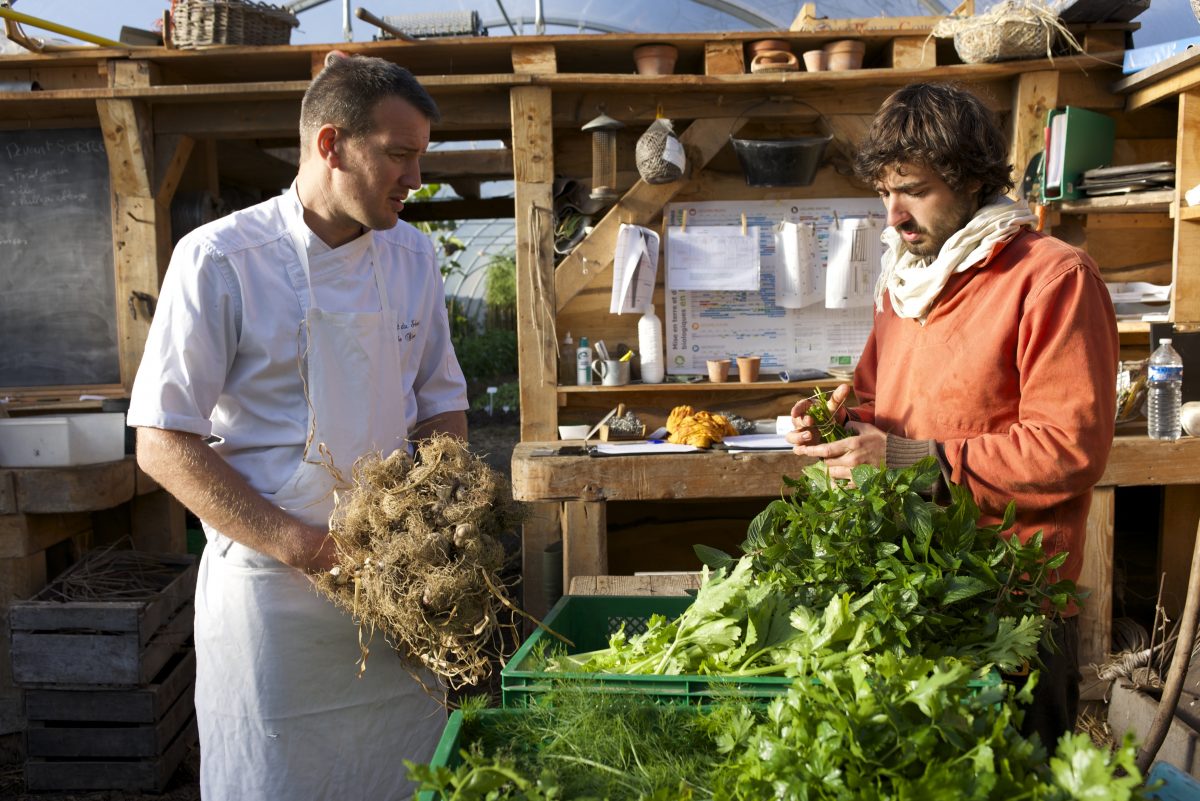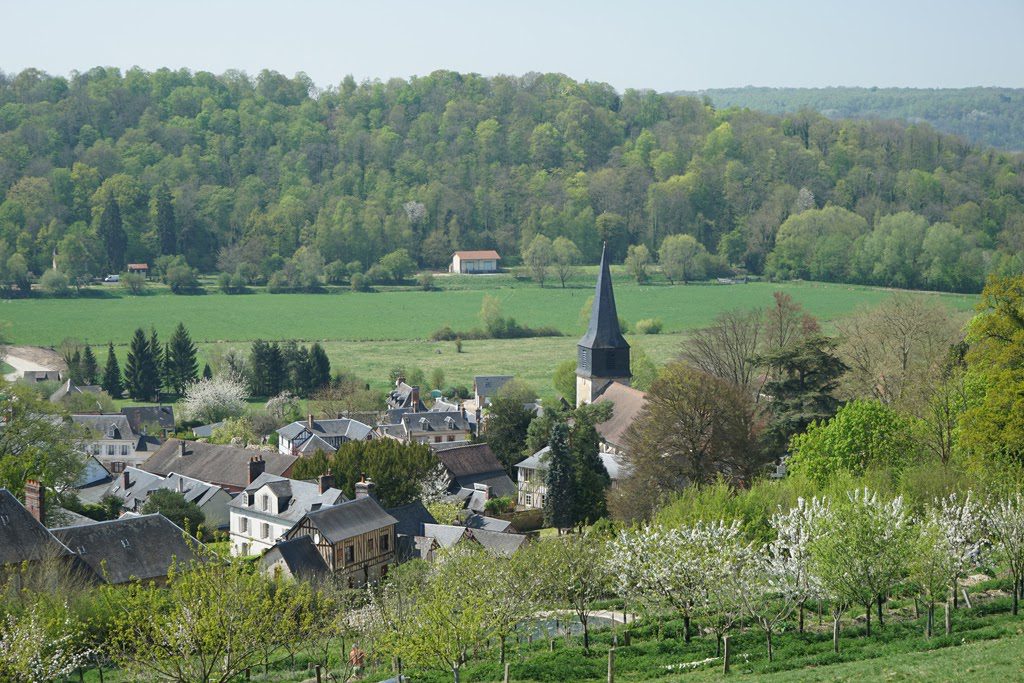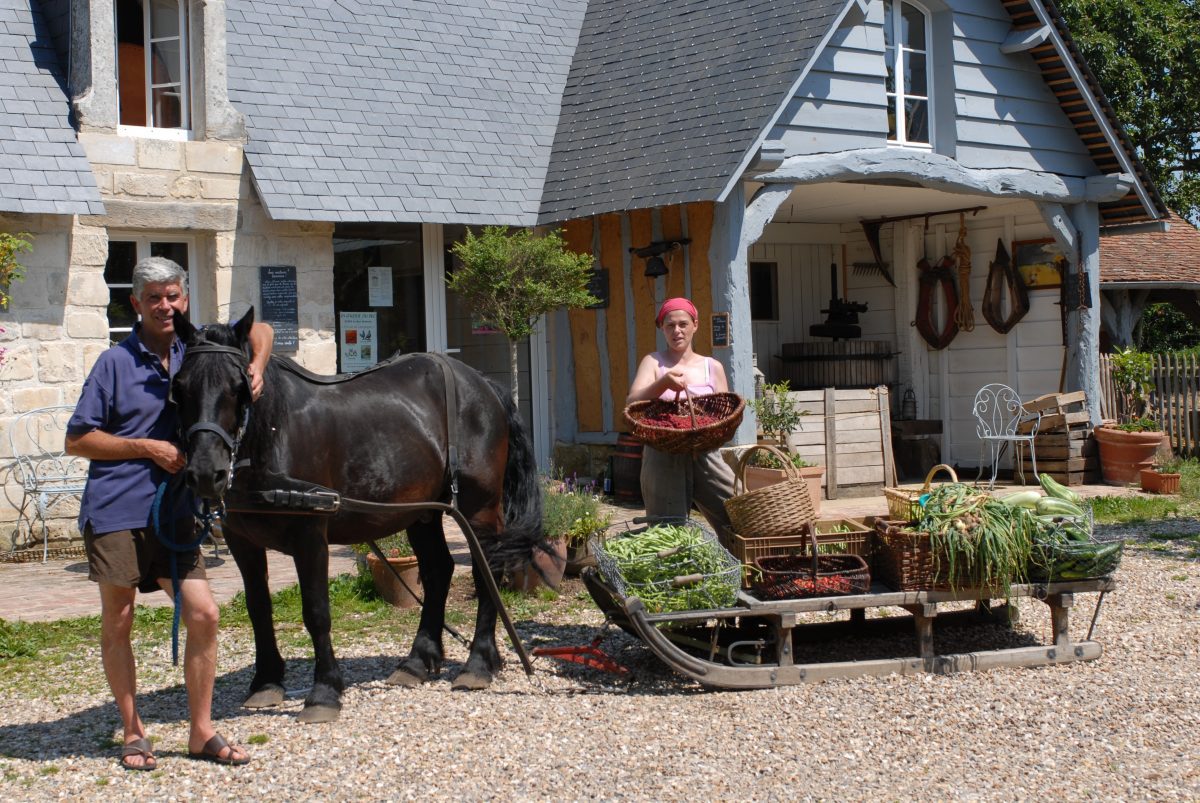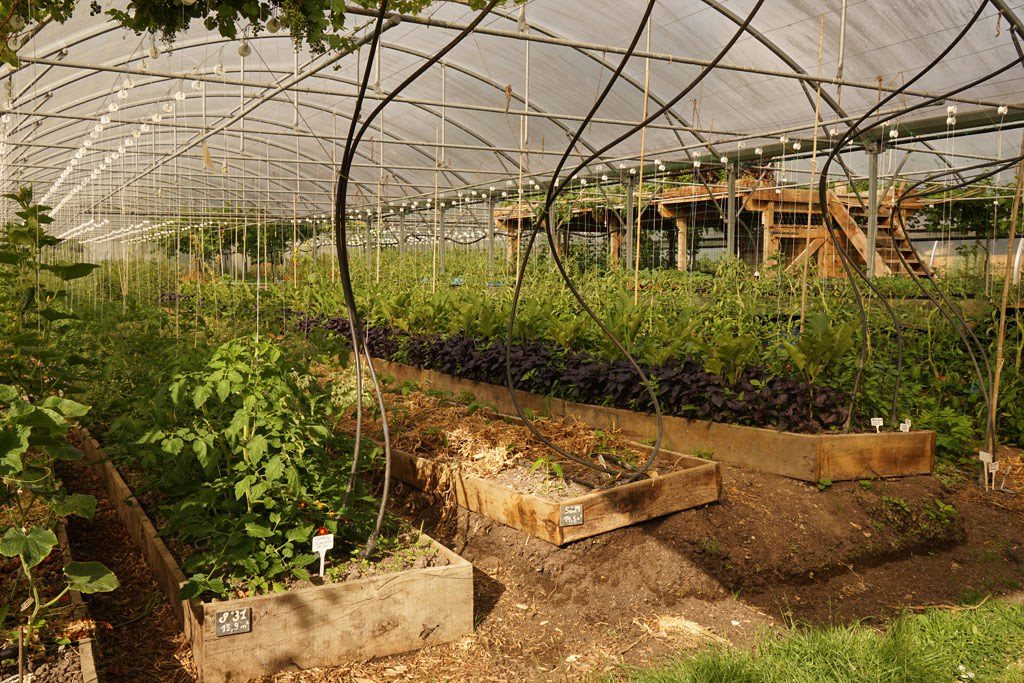Your cart is currently empty!
Start Small – The Story of Bec Hellouin Permaculture Farm – Resilience

Charles and Perrine Hervé-Gruyer decided to become low impact farmers in 2006. It was a long and difficult initiation. He had been a sailor, she an international lawyer; their efforts to grow food without mechanisation or chemicals were often ridiculed in the early years. But their farm in Normandy, Bec Hellouin, is now established as the premier permaculture farm in France. It is also the source of a number of scientific studies showing that it’s possible to make a living wage by growing food using permaculture techniques on just a quarter of an acre of land. Their book “Miraculous Abundance” was recently published in English. Alexis Rowell, a stalwart of the early Transition movement in the UK and author of the Transition book on local government, interviewed them on behalf of Transition Culture.
Alexis Rowell, a stalwart of the early Transition movement in the UK and author of the Transition book on local government, interviewed them on behalf of Transition Culture.
What motivated you to become farmers? Charles, you were a sailor; Perrine, you were an international lawyer. That’s a long way from the world of agriculture!
Charles: Personally, I always dreamed of being a farmer, but I grew up in Paris where everybody told me that it wasn’t possible for a Parisian to become a farmer so, by default, I became a sailor! And when I had my school-boat [a French version of Operation Raleigh allowing young people to travel the world in an educational setting] we shared the life of many farming communities, mostly in the global south. And after years and years of spending time with these farmers I was almost jealous of the intimacy they had with nature. I wanted to discover for myself this intimacy with nature. And with Perrine we were determined to be politically engaged, to do something for the planet, for humanity, without taking ourselves too seriously.
Perrine: We started our personal transition and family transition at the same time. The first door we went through was self-sufficiency. I liked that idea very much. Producing the food for a family of two children (now four), doing as much as possible for ourselves, household cleaning products, cosmetics, personal hygiene products – that was more or less the ambition. When, in 2006, Charles said he’d really like to work the land, I said ok even though I absolutely didn’t get it, or rather I didn’t see myself doing it. I told myself it was passing phase, that he’d get over it. But he persevered and it was so hard he had to do so many things that I felt obliged to give him a hand, and soon we became 100% engaged, without, if I‘m honest, me being totally happy at the start. For sure we were in organic agriculture, we were using animal traction, but the sense of it all was missing for me. From 2006 to 2008 it was chaotic and then in 2008 it was in a chance email that we discovered permaculture and that made sense because it reconciled our desire to be politically active but for a cause.
There aren’t many farmers who are also politicians and teachers like you two. You, Perrine, you’re even a local politician. And you, Charles, you have a natural gift for transmitting information.
C: I had a lot of trouble finding my place in life. I love travelling off the beaten track, but for me the adventure only has meaning if it is shared. And with the farm that’s naturally what we do. We never woke up one morning and said: “We’re going to sell, we’re going to make an innovative farm, we’re going to give permaculture classes, we’re going to contact the media, we’re going to do scientific research.” It came to us because people asked us to do it. But it seems it was a good fit with who we were.
P: We’re not the sort to go to demos – we do our demonstrations here! For years we didn’t stick our noses outside the farm, we forgot to engage with the local community. We’re not forcing our message on people. Even my political experience, I didn’t do it as a career, it amused me to move the lines from time to time. But we do have a strong sense of the need for action – I don’t think we could have done better if we’d done it differently. This path corresponds to our personalities.
C: I’ve always sought to live my dreams and living my dreams has been great for me and, in the end, it’s also been positive for others. As a market-gardener friend of ours says: “Utopia is like spinach – it shrinks in volume when you cook it – so you have to have a lot of utopia in your life!
What has surprised you most since the beginning of your adventure on the farm?
P: The impact the project has had. Even very recently I felt it was overestimated by comparison with reality because it’s hard to see past the daily difficulties. We manage a team – who are magnificent but it’s not easy every day; we manage the gardens – we became more distant from the gardens at one point in order to deal with the rest; and it’s difficult to fight against dispersion and dilution which is always a trap. But when we see that the people who come for training leave inspired, boosted, well, that boosts us too. Also, my political mandate, and the fact that our word travels a little further because of the media. When we see projects starting to appear all over the place, we feel that it would have been a shame not to do what we’ve done.
And you, Charles?
C: I agree. What also strikes me is the rapid evolution of the natural world around us. Because when we started, our land was very poor quality, there was only grass, and nature responded very quickly to our actions. We sought to put our intelligence as human beings to the service of nature and it’s as if the energy of the natural world and our energy converged on the luxurious, the abundant and the living. Despite our inexperience, the farm was transformed in barely ten years from a bare field to a rich eco-agro-system which surprises scientists. This capacity for repairing the planet more rapidly than one might think is possible from reading scientific papers, that gives a lot of hope for the generations to come.

What importance does the local community have for you? You know that Transition is above all about community, and you have created a community around you at the farm, but what about the wider community?
P: At the village level, yes. People know us. We’re here, we’re part of the landscape. And we’ve seen, over the years, confidence grow. It’s the local people who asked me to be a regional councillor. It wasn’t easy because at the beginning they saw us as Parisians. Anyone who’s not from here is a Parisian! And so they didn’t really understand us or our project. Lots of rumours circulated – mostly untrue – about who we were and what we wanted to do. They didn’t know. They understood that there was a farm but organic agriculture wasn’t an obvious choice when we began – it was pfff&X$£ [. Perrine emits a pooh-poohing sound that only French people can make and which can’t be translated!].
When we did our first markets, you had older folks who said things like: “Organic food makes me sick”, or “Organic is a hippy thing, isn’t it?”. So, we didn’t really reach people at the start. But now, in the village, we’re starting to be known. They see that we’re creating economic activity, that we’re part of the local economy. They were terrified when we announced recently at the village council that we were going to reduce the number of visits to the farm in 2018. That’s because we now support quite a few livelihoods locally. Why does the village appear on TV? Because of the “organic farm”, as they say. The people who don’t buy organic products or who don’t buy direct from a farmer, they don’t know us. But it will happen.

Charles, I think I read that you said that one shouldn’t talk too much about changing the world on arrival in a new community, is that right?
C: First of all, the mairie [can be the mayor or the local council] has always said “yes” to our projects so we’ve never been rejected! Secondly, you can create the most beautiful edible landscape in the world but if you don’t create the social links of shared values around it, then it will never amount to much. And it’s true the farm has had an important economic impact. When we arrived, the Bec Hellouin Abbey was the third tourist site in the département [county]. But now the Tourist Office receives more calls about the farm than about the Abbey.
What’s been your experience of the Transition Towns movement?
P: I did my PDC [Permaculture Design Course] in England with someone from Transition Town Lewes and that’s where I discovered the reality of what the movement was, that it was a lot about human permaculture, that it took months to change a recycling system. I arrived with my farming baggage. I was looking for solutions. I hadn’t yet understood that permaculture wasn’t just a solution for agriculture. And this experience enlightened me to the fact that as with all projects it’s about human management – so the concept of human permaculture started to take form for me.
In France we haven’t been closely connected to the movement but a lot of people who are part of the movement have come here for training, or they’ve asked us questions at conferences or other public events. In Normandy Frederic Sauvadet, who’s very close to us and to the farm, has signed an agreement with the region and with a lot of key regional players which will see the regional currency of Normandy recognised by all the institutions so that in the future we’ll be able to pay our local taxes with it as you can in Bristol, UK. And that’s a huge victory because it’s the whole of Normandy. Up until this deal was signed it was tough to convince retailers and businesses to participate, but now everything is possible.
What sort of national or international partnerships have you created through your work at the farm?
C: We have a lot of links with institutions, for example, with scientific institutions or universities. We’re often asked to take part in workshops or conferences. It’s frankly unbelievable that a tiny family farm can create links with as many different institutions. We didn’t go looking for it but it’s mostly very uplifting. And I think our institutions are much more capable of moving than we believe. For example, at the time of the COP21 climate negotiations in Paris, the wife of Laurent Fabius [the then French Foreign Minister] asked us to create a permaculture food garden for the Foreign Affairs Ministry. Now that, I would never have believed it.

What have been some of the highs and lows?
P: The lowest points were at the beginning: the technical errors, the arguments, the doubt. We had to do everything at the same time. We had to build us as a couple, create our family, change professions, start the farm… it was a voyage of initiation. The fear of not making it financially; before that I’d never had to check my bank account at the end of every month to see if we were going to make it or not. It was a very new experience and handling it wasn’t easy. And then relationships aren’t always easy. We are both used to leadership. We have had to align ourselves. We’re very different.
You’re both leaders, is that it? Or maybe strong personalities?
P: Yes! We’re very complementary – we don’t have the same skills – but we often find it hard to align them. The highs: the family, the farm – that’s part of building our cocoon. And then there was discovering the magic of the natural world and animals. Plus the the fact that we made it through despite everything.
C: We argued a lot for 13 years, but it’s been going really well for the last two weeks! [Everyone laughs!] It’s extremely intense. It’s like a boat. When it’s going badly, it goes really badly. But when it goes well, it’s just great. We left everyday normality behind, we plunged into deep abysses, we had marvellous moments and above all met a lot of incredible people. We gave everything. We pushed ourselves to the limits of our capacities. We almost neglected the children…
P: I still feel a guilty about that!
C: Sometimes we were close to the edge. We’ve been to hospital with serious conditions. But when the war was on, the resistance fighters risked their lives or risked being tortured. By comparison, we risk nothing: a bit of stress, a bit of tiredness, maybe we don’t have enough money sometimes. But given the importance, given the state of the planet – we’re both in agreement that we have to be politically committed. We can’t just sit here and enjoy our happy valley. And it’s hard. We work days, evenings, weekends, we give everything, but in the end, there is something that makes sense.
Have you sought help for you as a couple? Human permaculture?
P: All the time.
C: Of course. We were both psychotheraphists. We met at a school of holistic psychotherapy. We have constantly continued to work on ourselves because without that we would never have stayed the distance. The pressure that we’ve been under… we work seven days out of seven and almost never take holidays. But we’re still standing.

Your book, Miraculous Abundance, has been published in English and a number of other languages. Did that surprise you?
C: We were surprised when the Americans wanted to translate it and then bought the international rights. It’s going to published in Chinese soon. That’s a big surprise. This is a small farm in Normandy but we’re going to be read by small farmers in California and China. That was never our intention. Actually, we delayed the book for ages. There was no book in French on permaculture farming when we were asked to write one. But it’s easy to write a beautiful book which inspires people. We wanted to wait for the results of our technical study [which showed that a market gardener using permaculture techniques could make a living wage (£30,000-£35,000 per annum) from just a quarter of an acre of land by working 44 hours a week with four weeks holiday]. We wanted to be sure that it was economically viable. So we made them wait four years. And after all that it was a lovely surprise to find out that the book could inspire people all over the world.
Do you have any advice for those wanting to start micro-farms?
C: Small is beautiful! Start small and tend to your project carefully. The big trap is that people tend to think too big. We see very clearly now that the smaller and the more carefully tended a project is, the better it works.
P: You have to take the time to train yourself. You have to take the time to convince yourself or to test yourself in the profession, to dirty your hands in the soil and to really see what it’s all about. There is a lot of fantasy around these projects but there’s also a reality which is difficult. It can be absolutely incredible, but it can be a nightmare if it’s done without preparation, without a good human design, without a good design for the site. Take the time to make the transition. To teach yourself. You have to give yourself the time to be sure that it’s something you feel in your stomach and not just in the head and the heart!
C: The crazier the project, the more you have to take it seriously. Our project is mad, but we are extremely serious and pragmatic all the time.
On – 01 Dec, 2017 By Alexis Rowell

Leave a Reply